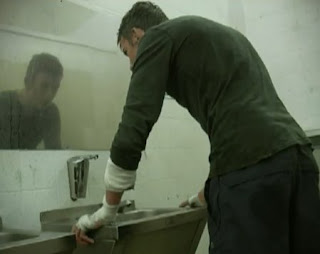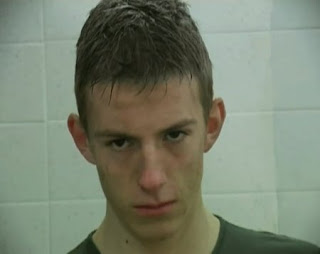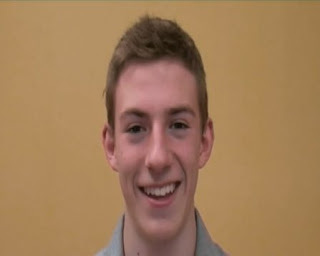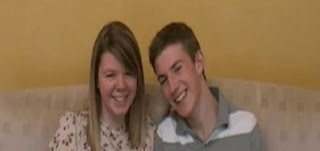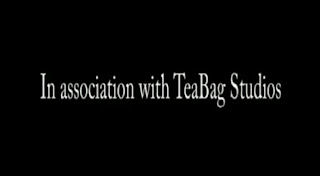 In our thriller opening we are able to incorporate many generic conventions into our opening scene. These conventions include establishing the protagonist, setting, plot, genre and narrative, as well as incorporating the creation of enigma.
In our thriller opening we are able to incorporate many generic conventions into our opening scene. These conventions include establishing the protagonist, setting, plot, genre and narrative, as well as incorporating the creation of enigma.In the opening shot of our thriller, we see our protagonist looking at his reflection in a mirror. This helps establish him as the protagonist as he is the first person the viewers see, and in many films, not just thriller films, the first person the audience gets to see is typically the protagonist.
The thriller opening is set in run down public toilets. This is clearly shown to the audience as the setting can be seen in almost all shots. Midway through the opening scene there is a flashback and the setting changes from a public toilet, to a family home. There is an obvious change from the cold, harsh setting of the public toilet to the warm and generally inviting setting of the family home. This again helps establish our protagonist as he is the first character we see in the flashback, and is the first person to talk in the film.
Our group was able to create a narrative for our thriller. We were able to do this by reversing different segments of the background noise taken from our original shots and use them in our opening scene. This created a mixture of peculiar sounds which helped create a genre as well as giving the audience an indication of the protagonists’ state of mind.
In our thriller opening, enigma is created for the audience at various points, predominantly during the flashback and also near the end of the opening scene during an upwards panning shot of some numbers on a wall. At both these points enigma is created, but as well as this, it also gives the audience an idea about the plot of the film.
The conventions that are incorporated into our thriller opening indicate that this film has a sub-genre. The sub-genre would make this film a crime thriller. This is because the film incorporates elements from the crime film genre as our film follows the protagonist, (the criminal), as he commits multiple murders to get his revenge.
When creating our thriller opening we were influences by other thriller films. A particular film that heavily influenced our thriller opening was ‘Oldboy’ (2003). We were influenced by the use of flashback in the opening scene, and also the films plot. Both Oldboy and our thriller show the protagonist in both the past and present through the use of flashbacks. As well as this, we were also influenced by the console game ‘Condemned 2’ as the appearance of our protagonist was based on ‘Ethan Thomas’, a character from the game.
There are a few different social classes and stereotypes represented in the opening of our thriller, and there is an obvious contrast between each of these. The main and most obvious social differences are of the protagonists past and present. In the past, during the flashback, the protagonist is shown as a typical working class person, in a stereotypical ‘happy family’. however, in the present, he is shown as a lower-lower class person. From this the audience gets the idea that protagonist is now a person that has very little to live for, as he now has nothing.
Age groups are also represented in our thriller opening. The characters in the thriller opening represent the ages of 18 - 25. This is because the protagonist is aged 19 during the flashbacks, and 22 in the present, however the audience are unaware of this. Although the audience does not know the ages of the protagonist, or the other character, the protagonists sister, seen in the flashback, it is obvious that these characters are between the ages of 18 - 25.
If our film was to be produced, it would most likely be produced and distributed by a small independent film company. This is due to the low budget and quality of our film. If our film was to have a larger budget, and possibly be of higher quality, it could be produced by a larger film company, but not a major studio such as the BFI or any other major British or Hollywood studio. Our particular film is a ‘one off’ and doesn’t offer the opportunity to have a franchise or sequel. Although our thriller film has a small budget, there is still an chance for some merchandising. Certain products such as t-shirts, mugs, jumpers and posters could be possible merchandise for our film.
Our thriller film is aimed at 15 - 29 year olds, particularly male teens, and young adults. Our film would be given a film classification of 15. This is because of the frequent use of strong violence and strong language. As well as this, viewers under the age of 15 may find particular scenes quite disturbing, especially some of the murder scenes.
Some films that are similar to our thriller film include Oldboy. Oldboy is similar to our thriller film as they both use flashbacks in their opening scenes. The Punisher is another film that has similarities with of our film. In The Punisher the theme of revenge is similar as in The Punisher the protagonist tries to get revenge on the people that killed his family and in our film the protagonist wants revenge on the 6 people that killed his sister.
After looking at both the questionnaire and interview research results, we were able to decide who to aim our thriller at, and also what should be included in it. From our results we could see that a large proportion of people preferred flashbacks and the contrast between the past and the present. Due to this we included a flashback in our opening sequence. Also, from our results we found that most people who filled in the questionnaire were aged between 16 - 21 years old. This influenced our decision to make our film appeal primarily to that age group.
Personally I feel that there are certain parts of our opening sequences that could scare younger children. For example, the main characters appearance, when not in the flashback, may scare younger children due to his threatening look. Throughout the opening sequence we used a range of different camera positions and angles to help show as much of the protagonist as possible, especially his face and expression. We also tried to used the camera in a way that made the protagonist seem as if he was walking towards you, almost as if he was coming to get you.
Our opening sequence doesn’t necessarily make the audience side with a particular character, however I feel the audience shall naturally side with the protagonist as his sister has been murdered. Although our film is about revenge and murder, we didn’t include any violence in the opening sequence as we wanted to create enigma. In doing this, we went against our research as we found out that violence does get the attention of the audience. But by doing this we were able to focus more on establishing the protagonist and the setting, as well as creating suspense and enigma. Originally we were going to use a soundtrack in our opening sequence but this idea was later changed. we reversed segments of the background noise, then used them throughout our opening sequence instead of a soundtrack as we though it would make the sequence seem a little more eerier.
Whilst filming our thriller opening sequence I helped with filming and lighting. The strengths of the camera equipment used was that it was able to pick up a lot of sound. This was useful as we did have some dialog in the flashback of our opening sequences. As well as this, we used some of the other background noise that was picked to create the reversed noise effects. There was a slight weakness with the camera equipment used as the batteries ran out quicker than expected and also the tripod we used frequently got stuck. This made it hard to perform panning shots. During the filming process there was only one problem we had and this was with the lighting. In some places the light was unpredictable, but this was quickly resolved by using artificial lighting in the darker settings and by blocking out the light that was to intense in brighter settings.
In this project I was able to do many things that I was unable to do in my preliminary project. In the thriller project we were able to use a wider range of camera shots and many different camera angles. As well as this, in this project we were able to used a lot more editing techniques to help bring our opening sequence together. In editing, I learnt many new and useful techniques such as how to manipulate certain sounds and also how to layer them. As well as this, I also learnt how to use the many different transitions to help create certain effects in different parts of our opening sequence.
Looking back at my preliminary task, I feel that I have learnt many things in the progression from the preliminary task to the final product, and I feel my thriller project has been much more successful than my preliminary. I feel this was because of the planning and research that has been put into our thriller project. Throughout the planning stage the research we gathered about the audience through questionnaires and interviews really helps with the development of our ideas. As well as this, watching many different thriller film openings enabled us to see the different conventions we could incorporate into our opening sequence. All of this really helped us when creating and storyboarding our ideas.
During the planning and filming of our thriller opening, our main ideas didn’t change drastically. The only changes we had were some slight camera angle changes due to restrictions of where we were filming. However our original storyboarded ideas didn’t change.
Since starting this project I have become more confident when using both the camera equipment and editing software. I have learnt a great deal of new editing techniques, I have enjoyed both the editing and filming process greatly.
After receiving some audience feedback we found out that most people were pleased with the way we created suspense, primarily due to the reversed background sounds we used. As well as this, many people commented on our character development in the opening of our thriller film. They like the way we were able create contrast between the past and present and the juxtaposition of the protagonist between the two. In addition, the audience commented on how enigma was cleverly created through the plot and mise-en-scene.
Overall I am please with the outcome of my groups thriller opening sequence, and I feel it has met the brief of the thriller project. However I do feel that my group and I could have been more adventurous with some of the camera angles used as well as the font used for the credits.
